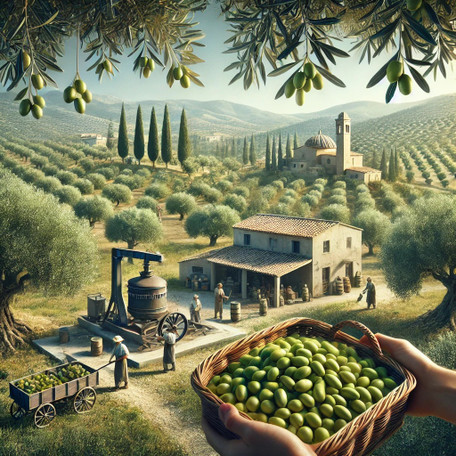The Economic Impact of Olive Production in Mediterranean Countries
10th Aug 2024
The Economic Impact of Olive Production in Mediterranean Countries
Olive cultivation is deeply intertwined with the culture, history, and economy of the Mediterranean region. Countries like Spain, Italy, and Greece have long been recognized as global leaders in olive production, contributing significantly to their national economies and playing a crucial role in the livelihoods of millions of people. The olive industry is not only a key driver of agricultural output but also a vital component of the agri-food sector, influencing trade balances, employment, and rural development. This blog post explores the economic significance of olive cultivation in these Mediterranean countries, highlighting the challenges and opportunities facing the industry.
The Mediterranean Olive Belt: An Overview
The Mediterranean region is often referred to as the "olive belt" due to its ideal climate for olive cultivation. The warm, dry summers and mild, wet winters create the perfect conditions for olive trees, which have been cultivated in this region for over 6,000 years. Today, the Mediterranean accounts for over 95% of the world's olive production, with Spain, Italy, and Greece being the top producers.
Spain is the largest olive producer in the world, contributing nearly 50% of global olive oil production. The Andalusian region, in particular, is known for its extensive olive groves, which cover millions of hectares and form the backbone of the local economy. Olive production in Spain is characterized by both traditional and modern farming practices, with a strong emphasis on quality and sustainability.
Italy follows closely behind Spain in terms of production, with regions like Puglia, Calabria, and Sicily leading the way. Italian olive oil is renowned for its quality and diversity, with various Protected Designation of Origin (PDO) and Protected Geographical Indication (PGI) labels that highlight the unique characteristics of different regions. The Italian olive industry is also known for its small-scale, family-owned farms that have been passed down through generations.
Greece is another major player in the olive industry, particularly famous for its Kalamata olives and extra virgin olive oil. Olive cultivation in Greece is deeply rooted in tradition, with many groves dating back centuries. The olive sector is a significant contributor to the Greek economy, particularly in rural areas where it provides employment and supports local communities.
Economic Significance of Olive Production
Olive production is a cornerstone of the agricultural economy in Spain, Italy, and Greece. It provides a stable source of income for millions of farmers, particularly in rural areas where alternative employment opportunities may be limited. The economic significance of olive production extends beyond the farm gate, encompassing the entire value chain, from harvesting and processing to marketing and export.
- Employment and Rural Development
One of the most significant economic impacts of olive production is its contribution to employment and rural development. The olive industry supports millions of jobs across the Mediterranean, from farm laborers and harvesters to workers in processing plants, distribution networks, and retail. In regions like Andalusia in Spain, Puglia in Italy, and Crete in Greece, the olive industry is often the largest employer, providing vital income and supporting rural economies.
In addition to direct employment, olive production also supports a wide range of ancillary industries, including machinery manufacturing, packaging, and logistics. The presence of these industries helps to sustain local economies and create a multiplier effect, where the economic benefits of olive production ripple through the community.
- Export Revenues and Trade Balances
Olive oil is one of the most important agricultural exports for Mediterranean countries, contributing significantly to their trade balances. Spain, Italy, and Greece are among the world's top exporters of olive oil, with their products highly sought after in global markets. The demand for high-quality extra virgin olive oil, in particular, has been growing steadily, driven by increasing consumer awareness of its health benefits and culinary versatility.
For Spain, olive oil is the second most valuable agricultural export after wine, with major markets including the European Union, the United States, and China. Italy, known for its premium olive oil brands, also enjoys strong export revenues, with a significant portion of its production destined for high-end markets in Europe, North America, and Asia. Greece, while smaller in production volume compared to Spain and Italy, is renowned for the quality of its olive oil and has a strong presence in niche markets.
The export of olive oil not only generates significant revenues for these countries but also helps to offset trade deficits in other sectors. The olive oil industry plays a crucial role in balancing the trade portfolios of Mediterranean nations, contributing to their overall economic stability.
- Value-Added Products and Agri-Tourism
The olive industry has also been instrumental in the development of value-added products and agri-tourism, both of which contribute to the economic vitality of Mediterranean countries. Value-added products, such as flavored olive oils, olive-based cosmetics, and gourmet olive snacks, have become increasingly popular, offering higher profit margins and opening up new markets for producers.
Agri-tourism, particularly in regions with a strong olive-growing tradition, has also become a significant source of income. Olive oil tasting tours, visits to historic olive mills, and culinary experiences centered around olive oil have attracted tourists from around the world, providing additional revenue streams for local communities. This form of tourism not only supports the olive industry but also helps to preserve cultural heritage and promote sustainable rural development.
Challenges Facing the Olive Industry
Despite its economic significance, the olive industry in Mediterranean countries faces several challenges that threaten its sustainability and profitability. These challenges include climate change, market volatility, competition, and regulatory pressures.
- Climate Change
Climate change poses a significant threat to olive cultivation in the Mediterranean. The region is already experiencing higher temperatures, reduced rainfall, and more frequent extreme weather events, all of which can negatively impact olive yields and quality. Droughts, in particular, are a major concern, as olive trees require adequate water to produce healthy fruit.
In response to these challenges, some farmers are adopting more resilient farming practices, such as drought-resistant olive varieties, efficient irrigation systems, and organic farming methods. However, the costs associated with these adaptations can be prohibitive, particularly for small-scale farmers.
- Market Volatility and Competition
The olive oil market is highly competitive, with prices subject to fluctuations due to factors such as global production levels, consumer demand, and currency exchange rates. Market volatility can be particularly challenging for small and medium-sized producers who may lack the financial resources to absorb price shocks.
In addition to market volatility, Mediterranean producers face increasing competition from emerging olive oil-producing countries, such as Tunisia, Turkey, and Australia. These countries have invested heavily in modern olive farming techniques and are able to produce high-quality olive oil at lower costs, putting pressure on traditional producers in Spain, Italy, and Greece.
- Regulatory Pressures and Fraud
The olive oil industry is also subject to strict regulatory standards, particularly in the European Union, where quality control and labeling requirements are rigorously enforced. While these regulations help to protect consumers and ensure product quality, they can also create additional costs for producers, particularly in terms of compliance and certification.
Fraud and adulteration are also significant issues in the olive oil industry. Some producers have been found to mix olive oil with cheaper oils or sell lower-quality products as extra virgin, undermining consumer trust and damaging the reputation of legitimate producers. Efforts to combat fraud include stricter enforcement of labeling laws, improved traceability systems, and increased consumer education.
Opportunities for Growth and Innovation
Despite these challenges, the olive industry in Mediterranean countries also presents numerous opportunities for growth and innovation. By embracing sustainable practices, investing in research and development, and exploring new markets, the industry can continue to thrive and contribute to the economic prosperity of the region.
- Sustainability and Organic Farming
There is growing consumer demand for sustainably produced and organic olive oil, driven by concerns about environmental impact and health. Mediterranean producers have the opportunity to capitalize on this trend by adopting organic farming practices, reducing their carbon footprint, and promoting the environmental benefits of olive cultivation.
Sustainable practices, such as using organic fertilizers, minimizing pesticide use, and conserving water, not only appeal to eco-conscious consumers but also help to preserve the long-term viability of olive groves. Additionally, organic certification can open up new markets and command premium prices, providing a competitive advantage for producers.
- Innovation and Technology
Innovation and technology play a crucial role in the future of the olive industry. Advances in precision agriculture, such as the use of drones, sensors, and satellite imagery, can help farmers monitor crop health, optimize irrigation, and increase yields. Similarly, innovations in olive oil processing, such as cold-pressing and centrifugation techniques, can improve oil quality and extraction efficiency.
Investing in research and development is also essential for the industry’s growth. Developing new olive varieties that are resistant to pests and diseases, as well as breeding olives with higher oil content, can enhance productivity and profitability. Collaboration between industry stakeholders, research institutions, and governments is key to driving innovation and ensuring the long-term sustainability of the olive sector.
- Exploring New Markets
While traditional markets for olive oil, such as Europe and North America, remain important, there are also opportunities for Mediterranean producers to expand into emerging markets. Countries in Asia, particularly China and India, are experiencing growing demand for olive oil, driven by rising incomes, urbanization, and increasing awareness of its health benefits.
Marketing efforts that highlight the unique qualities and health benefits of Mediterranean olive oil can help producers tap into these new markets. Additionally, investing in branding and certification, such as PDO and PGI labels, can differentiate products and build consumer trust in regions where olive oil is still a relatively new product.
Conclusion
Olive production is a vital economic activity in Mediterranean countries like Spain, Italy, and Greece. It supports millions of jobs, contributes to export revenues, and plays a key role in rural development. However, the industry also faces significant challenges, including climate change, market volatility, competition, and regulatory pressures.
By embracing sustainability, innovation, and exploring new markets, the olive industry in the Mediterranean can continue to thrive and contribute to the region’s economic prosperity. The future of olive cultivation will depend on the ability of producers to adapt to changing conditions, meet consumer demands, and maintain the high standards of quality that have made Mediterranean olive oil renowned worldwide.
In this way, the olive industry not only sustains the economies of Mediterranean countries but also preserves a cultural and agricultural heritage that has been passed down through generations, ensuring that the benefits of olive cultivation continue to be enjoyed for years to come.




